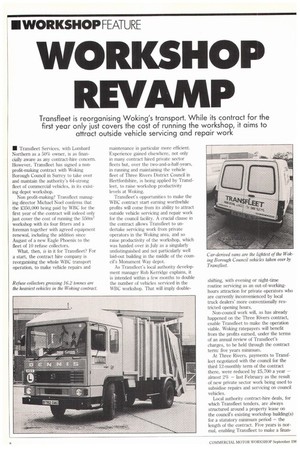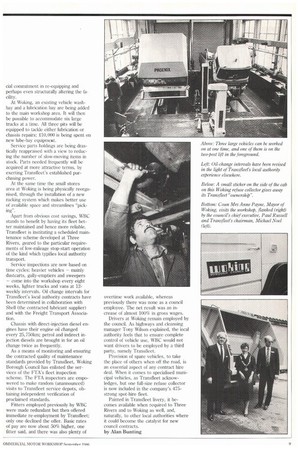WORKSHOP REVAMP
Page 100

Page 101

If you've noticed an error in this article please click here to report it so we can fix it.
Transfleet is reorganising Woking's transport. While its contract for the first year only just covers the cost of running the workshop, it aims to attract outside vehicle servicing and repair work
• Services, with Lombard Northern as a 50% owner, is as financially aware as any contract-hire concern. However, Transfleet has signed a nonprofit-making contract with Woking Borough Council in Surrey to take over and maintain the authority's 64-strong fleet of commercial vehicles, in its existing depot workshop.
Non profit-making? Transfleet managing director Michael Noel confirms that the 2350,000 being paid by WBC for the first year of the contract will indeed only just cover the cost of running the 550m2 workshop with its four fitters and a foreman together with agreed equipment renewal, including the addition since August of a new Eagle Phoenix to the fleet of 10 refuse collectors.
What, then, is in it for Transfleet? For a start, the contract hire company is reorganising the whole WBC transport operation, to make vehicle repairs and maintenance in particular more efficient. Experience gained elsewhere, not only in many contract hired private sector fleets but, over the two-and-a-half-years, in running and maintaining the vehicle fleet of Three Rivers District Council in Hertfordshire, is being applied by Transfleet, to raise workshop productivity levels at Woking.
Transfleet's opportunities to make the WBC contract start earning worthwhile profits will come from its ability to attract outside vehicle servicing and repair work for the council facility. A crucial clause in the contract allows Transfleet to undertake servicing work from private operators in the Woking area, and so raise productivity of the workshop, which was handed over in July as a singularly undistinguished and not particularly well laid-out building in the middle of the council's Monument Way depot.
As Transfleet's local authority development manager Rob Kerridge explains, it is intended within a few months to double the number of vehicles serviced in the WBC workshop. That will imply double shifting, with evening or night-time routine servicing as an out-of-workinghours attraction for private operators who are currently inconvenienced by local truck dealers' more conventionally restricted opening hours.
Non-council work will, as has already happened on the Three Rivers contract, enable Transfleet to make the operation viable. Woking ratepayers will benefit from the profits earned, under the terms of an annual review of Transfleet's charges, to be held through the contract term: five years minimum.
At Three Rivers, payments to Transfleet negotiated with the council for the third 12-monthly term of the contract there, were reduced by £5,700 a year — almost 2% — last February as the result of new private sector work being used to subsidise repairs and servicing on council vehicles.
Local authority contract-hire deals, for which Transfleet tenders, are always structured around a property lease on the council's existing workshop building(s) for a statutory minimum period — the length of the contract. Five years is normal, enabling Transfleet to make a finan cial commitment in re-equipping and perhaps even structurally altering the facility.
At Woking, an existing vehicle washbay and a lubrication bay are being added to the main workshop area. It will then be possible to accommodate six large trucks at a time. All three pits will be equipped to tackle either lubrication or chassis repairs; £10,000 is being spent on new lube-bay equipment.
Service parts holdings are being drastically reappraised with a view to reducing the number of slow-moving items in stock. Parts needed frequently will be acquired at more attractive terms, by exerting Transfleet's established purchasing power.
At the same time the small stores area at Woking is being physically reorganised, through the installation of a new racking system which makes better use of available space and streamlines "picking".
Apart from obvious cost savings, WBC stands to benefit by having its fleet better maintained and hence more reliable. Transfleet is instituting a scheduled maintenance scheme developed at Three Rivers, geared to the particular requirements of low-mileage stop-start operation of the kind which typifies local authority transport.
Service inspections are now based on time cycles; heavier vehicles — mainly dustcarts, gully-emptiers and sweepers — come into the workshop every eight weeks, lighter trucks and vans at 12weekly intervals. Oil change intervals for Transfleet's local authority contracts have been determined in collaboration with Shell (the contracted lubricant supplier) and with the Freight Transport Association.
Chassis with direct-injection diesel engines have their engine oil changed every 25,750km; petrol and indirect injection diesels are brought in for an oil change twice as frequently.
As a means of monitoring and ensuring the contracted quality of maintenance standards provided by Transfleet, Woking Borough Council has enlisted the services of the FIA's fleet inspection scheme. The FTA inspectors are empowered to make random (unannounced) visits to Transfleet service depots, obtaining independent verification of proclaimed standards.
Fitters employed previously by WBC were made redundant but then offered immediate re-employment by Transfleet; only one declined the offer. Basic rates of pay are now about 50% higher, one fitter said, and there was also plenty of overtime work available, whereas previously there was none as a council employee. The net result was an increase of almost 100% in gross wages.
Drivers at Woking remain employed by the council. As highways and cleansing manager Tony Wilson explained, the local authority feels that to ensure complete control of vehicle use, WBC would not want drivers to be employed by a third party, namely Transfleet.
Provision of spare vehicles, to take the place of others when off the road, is an essential aspect of any contract hire deal. When it comes to specialised municipal vehicles, as Transfleet acknowledges, but one full-size refuse collector is now included in the company's 475strong spot-hire fleet.
Painted in Transfleet livery, it becomes available when required to Three Rivers and to Woking as well, and, naturally, to other local authorities where it could become the catalyst for new council contracts.
by Alan Bunting
















































































































